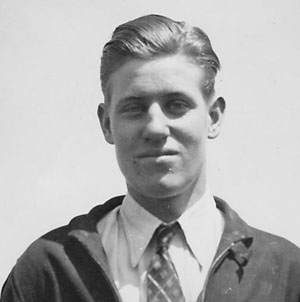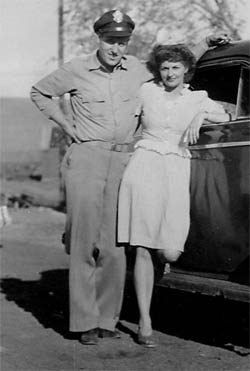 | DON WISE
was born on November 13, 1918 in Miles City, Custer County, Montana,
just two days after the signing of the Armistice that ended World War I.
There was some discussion that his middle name would be "Pershing" (in
honor of General John "Blackjack" Pershing), but that never
materialized, and Don received no middle name. He was born during the raging flu epidemic that killed millions of people throughout the world, and when he was born, his mother already had the flu. Within two weeks, Don himself contracted the disease. He had an extremely high fever, but by the grace of God both he and his mom recovered. |
| DON'S EARLY YOUTH
When he was three years old, Don's family moved to a part of Custer County that later became Powder River County, and homesteaded 640 acres on Cache Creek, about 30 miles west of Broadus, Montana, and about 22 miles east to a small store and post office at Epsie, Montana. They would travel to the store once a week to get the mail, usually on horseback, or with a team of horses hooked to a buggy. The chore of getting the mail was usually delegated to Don's older brother Charles who was only 15 years old at the time. Charles would also purchase much needed supplies and stow them in saddle bags on each side of the rear of the saddle. The round trip to the store usually took six to seven hours. They moved with a team of horses and a covered wagon and started from scratch, building a resevoir on Cache Creek so they could have water for the stock. They built a log house that had a sod roof, an overhanging porch, a log barn, log corrals, even the outhouse was made of logs. They were four miles away from their nearest neighbor. There was a big poplar grove on the creek and it was a favority place for all the neighbors from miles around to come and have a picnic in the summertime. There is a book that speaks of this area of Montana from this time period, and mentions the Wises and the "favorite" picnic spot. It is called "Echoing Footsteps; Powder River County" (1967; by the Powder River County Extension Homemakers Council; Ashton Printing & Engraving Co., Butte, Montana). The book shows a picture of Don's mother, Alda Wise, feeding turkeys with the log outhouse in the background. The ranch had between 40-50 head of cattle, 25 or 30 horses, sheep, hogs, chickens and even a couple of wild pup coyotes that Don's brother Glen dug out of a den after he killed the mother. The Wises raised their own beef, hay, and some seed grain. The four Wise brothers were Charlie, Glen (they always called him "Deb"), Don and Luke. Their sister was Edith. Don started school when he was seven. He first attended the Bottles School, a one-room schoolhouse with 17 or 18 students and one teacher--Hazel Harris. The school stood on land that was originally owned by a man named Fred Bottles, hence its name--Bottles School. It was seven miles from the ranch, and they usually walked the distance in an hour and 15 minutes when the weather was good. When it was cold, they would ride a horse. During the winters, the temperature would drop to as low as 50 degrees below zero. In 1924, Don's dad took the family's 1922 Model T Ford and left home to work in the oil fields of Casper, Wyoming, and never returned. Don's mother Alda had to raise the family alone. She eventually sold the ranch in 1929 and moved to Lodge Grass, Montana. They took a team of horses and a Studebaker covered wagon and traveled the 135 miles in a week. Don's younger brother Luke (Luther) took turns driving the 12 head of cattle and the sheep. Since he and Luke only had one pair of shoes between them, the one who was on foot got to wear them while the one on the horse went barefoot. They rented a small 80 acre ranch about a mile south of Lodge Grass located on the Crow Indian Reservation. They rented the ranch from an Indian gentleman named Henry Pretty-On-Top. The ranch was located about 20 miles south of the famous Custer Battlefield where General George Armstrong Custer met his demise at the hands of approximately 5,000 Sioux and Cheyenne Indians at the battle of the Little Bighorn. AS A YOUNG MAN Don lived in Lodge Grass until he was a young man. One day he and his brother Luke sold an old horse and bought a Model-T Ford that wouldn't run. He and Luke worked on it until it did. There was no place to sit in the back, so they propped a board on it and the passengers would ride on the board. On one occasion an Indian boy and Don were sitting on the board and Luke was driving. They went around a sharp turn and the board flipped up, throwing one boy off one way and Don off and under the wheel of the vehicle. Don looked up just as the rear wheel went over his face and down his body but luckily there was no weight to the car, and it wasn't too painful. Luke kept driving, unaware he had lost his two passengers for quite a distance. Don got a job in an automotive garage so he could make enough money to buy clothes. He would come in during the early morning, then clean up and go to school. After school he would work in the evening until 7:00 p.m. On Saturdays he would go in and work all day. In November, 1934, when he was 16, Don became adventuresome and, anxious to see the world, hopped a freight train in Lodge Grass with a friend by the name of Jack Layton. They went south to Louisiana for a couple of months. His mother didn't know about the plan until after he was gone, but he soon wrote her a letter. It took him 10 days to get to Louisiana--all the while trying to avoid the railroad "bulls"--the name given to railroad detectives that roamed around the railyards kicking people off the trains. Don and Jack got off the train in Shelbina, Missouri (about 40 miles west of Hannibal), where Don's uncle, Dow Harmon, owned a service station and a restaurant. During his stay in Louisiana, Don stayed with the Hicks family--a family that had lived a few years before in Lodge Grass, Montana. Mr. Hicks was a foreman on a cotton plantation, and Don soon discovered that a life picking cotton was not the career for him. In 1935, Don's father invited him to come to Utah to live and finish high school, which he did in 1936. |
 | DON AND BONNIE WISE became husband and wife in 1939. When the Japanese bombed Pearl Harbor, Don was working in Seattle, Washington, at Boeing. He was just arriving at the plant when he heard over the radio that the Japanese had attacked. Before long, Don enlisted in the U.S. Army Air Corps. While Don prepared to fight, his wife Bonnie assisted in the war effort by working in a munitions industrial plant in Spokane, Washington. After the war, she accompanied Don through his 21 years of active duty in the Air Force, including moves to Germany and Japan, and to various bases in the U.S. They were married for 49 years before Bonnie passed away in 1988, having raised four children: Bonnie Faye (Sandy)--1941, Michael--1949, Edith (Dede)--1951, and John--1953. |
Education has always been important to Don. He graduated from Weber State University (Ogden, Utah) in the Class of 1978 from which he received a degree in Welding Engineering Technology. He was just five months from his 60th birthday at that time.
Don retired from the Air Force in 1963 as a Major, giving him 21 years of active duty and over 3750 hours of flying time. He maintained an active private pilot's license until 1984 when his health began to deteriorate. He now resides in sunny Mesquite, Nevada, with his wife Jane (who is a retired nurse), and their two small poodles.
Update (By Jimmy): Don Wise passed away on March 17, 2007 in Saint George Washington County, Utah. A link to his obituary and memorial info can be found here.
C O N T E N T S:
Distinguished Flying Cross |
"Pig Chaser" & Its Crew |
The "Best Seat in the House" |
List of 50 Missions |
The Ploesti Campaign |